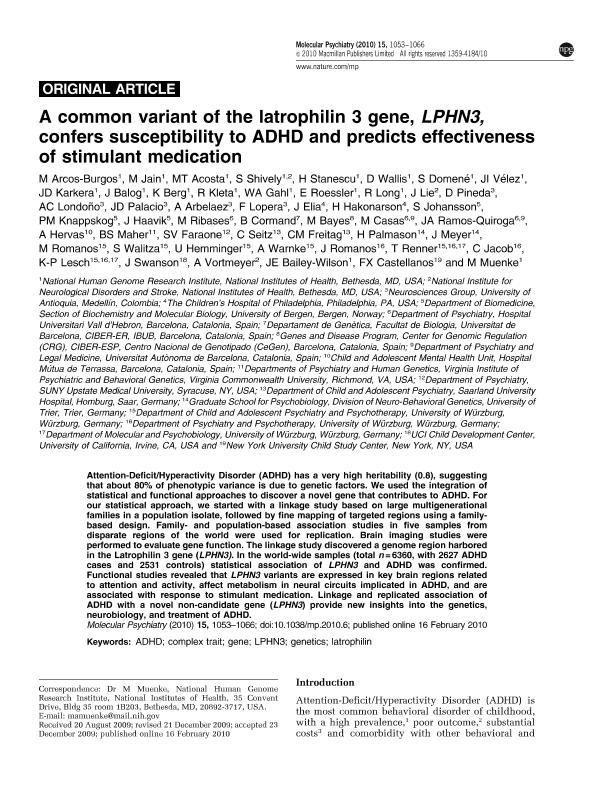Artículo
A common variant of the latrophilin 3 gene, LPHN3, confers susceptibility to ADHD and predicts effectiveness of stimulant medication
Arcos Burgos, M.; Jain, M.; Acosta, M. T.; Shively, S.; Stanescu, H.; Wallis, D.; Domene, Sabina ; Vélez, J .I.; Karkera, J. D.; Balog, J.; Berg, K.; Kleta, R.; Gahl, W. A.; Roessler, E.; Long, R.; Lie, J.; Pineda, D.; Londoño, A. C.; Palacio, J. D.; Arbelaez, A.; Lopera, F.; Elia, J.; Hakonarson, H.; Johansson, S.; Knappskog, P. M.; Haavik, J.; Ribases, M.; Cormand, B.; Bayes, M.; Casas, M.; Ramos Quiroga, J. A.; Hervas, A.; Maher, B. S.; Faraone, S. V.; Seitz, C.; Freitag, C. M.; Palmason, H.; Meyer, J.; Romanos, M.; Walitza, S.; Hemminger, U.; Warnke, A.; Romanos, J.; Renner, T.; Jacob, C.; Lesch, K. P.; Swanson, J.; Vortmeyer, A.; Bailey Wilson, J. E.; Castellanos, F. X.; Muenke, M.
; Vélez, J .I.; Karkera, J. D.; Balog, J.; Berg, K.; Kleta, R.; Gahl, W. A.; Roessler, E.; Long, R.; Lie, J.; Pineda, D.; Londoño, A. C.; Palacio, J. D.; Arbelaez, A.; Lopera, F.; Elia, J.; Hakonarson, H.; Johansson, S.; Knappskog, P. M.; Haavik, J.; Ribases, M.; Cormand, B.; Bayes, M.; Casas, M.; Ramos Quiroga, J. A.; Hervas, A.; Maher, B. S.; Faraone, S. V.; Seitz, C.; Freitag, C. M.; Palmason, H.; Meyer, J.; Romanos, M.; Walitza, S.; Hemminger, U.; Warnke, A.; Romanos, J.; Renner, T.; Jacob, C.; Lesch, K. P.; Swanson, J.; Vortmeyer, A.; Bailey Wilson, J. E.; Castellanos, F. X.; Muenke, M.
 ; Vélez, J .I.; Karkera, J. D.; Balog, J.; Berg, K.; Kleta, R.; Gahl, W. A.; Roessler, E.; Long, R.; Lie, J.; Pineda, D.; Londoño, A. C.; Palacio, J. D.; Arbelaez, A.; Lopera, F.; Elia, J.; Hakonarson, H.; Johansson, S.; Knappskog, P. M.; Haavik, J.; Ribases, M.; Cormand, B.; Bayes, M.; Casas, M.; Ramos Quiroga, J. A.; Hervas, A.; Maher, B. S.; Faraone, S. V.; Seitz, C.; Freitag, C. M.; Palmason, H.; Meyer, J.; Romanos, M.; Walitza, S.; Hemminger, U.; Warnke, A.; Romanos, J.; Renner, T.; Jacob, C.; Lesch, K. P.; Swanson, J.; Vortmeyer, A.; Bailey Wilson, J. E.; Castellanos, F. X.; Muenke, M.
; Vélez, J .I.; Karkera, J. D.; Balog, J.; Berg, K.; Kleta, R.; Gahl, W. A.; Roessler, E.; Long, R.; Lie, J.; Pineda, D.; Londoño, A. C.; Palacio, J. D.; Arbelaez, A.; Lopera, F.; Elia, J.; Hakonarson, H.; Johansson, S.; Knappskog, P. M.; Haavik, J.; Ribases, M.; Cormand, B.; Bayes, M.; Casas, M.; Ramos Quiroga, J. A.; Hervas, A.; Maher, B. S.; Faraone, S. V.; Seitz, C.; Freitag, C. M.; Palmason, H.; Meyer, J.; Romanos, M.; Walitza, S.; Hemminger, U.; Warnke, A.; Romanos, J.; Renner, T.; Jacob, C.; Lesch, K. P.; Swanson, J.; Vortmeyer, A.; Bailey Wilson, J. E.; Castellanos, F. X.; Muenke, M.
Fecha de publicación:
11/2010
Editorial:
Nature Publishing Group
Revista:
Molecular Psychiatry
ISSN:
1359-4184
Idioma:
Inglés
Tipo de recurso:
Artículo publicado
Clasificación temática:
Resumen
Attention-Deficit/Hyperactivity Disorder (ADHD) has a very high heritability (0.8), suggesting that about 80% of phenotypic variance is due to genetic factors. We used the integration of statistical and functional approaches to discover a novel gene that contributes to ADHD. For our statistical approach, we started with a linkage study based on large multigenerational families in a population isolate, followed by fine mapping of targeted regions using a family-based design. Family- and population-based association studies in five samples from disparate regions of the world were used for replication. Brain imaging studies were performed to evaluate gene function. The linkage study discovered a genome region harbored in the Latrophilin 3 gene (LPHN3). In the world-wide samples (total n6360, with 2627 ADHD cases and 2531 controls) statistical association of LPHN3 and ADHD was confirmed. Functional studies revealed that LPHN3 variants are expressed in key brain regions related to attention and activity, affect metabolism in neural circuits implicated in ADHD, and are associated with response to stimulant medication. Linkage and replicated association of ADHD with a novel non-candidate gene (LPHN3) provide new insights into the genetics, neurobiology, and treatment of ADHD.
Palabras clave:
Adhd
,
Complex Trait
,
Gene
,
Genetics
,
Latrophilin
,
Lphn3
Archivos asociados
Licencia
Identificadores
Colecciones
Articulos(INGEBI)
Articulos de INST.DE INVEST.EN ING.GENETICA Y BIOL.MOLECULAR "DR. HECTOR N TORRES"
Articulos de INST.DE INVEST.EN ING.GENETICA Y BIOL.MOLECULAR "DR. HECTOR N TORRES"
Citación
Arcos Burgos, M.; Jain, M.; Acosta, M. T.; Shively, S.; Stanescu, H.; et al.; A common variant of the latrophilin 3 gene, LPHN3, confers susceptibility to ADHD and predicts effectiveness of stimulant medication; Nature Publishing Group; Molecular Psychiatry; 15; 11; 11-2010; 1053-1066
Compartir
Altmétricas



